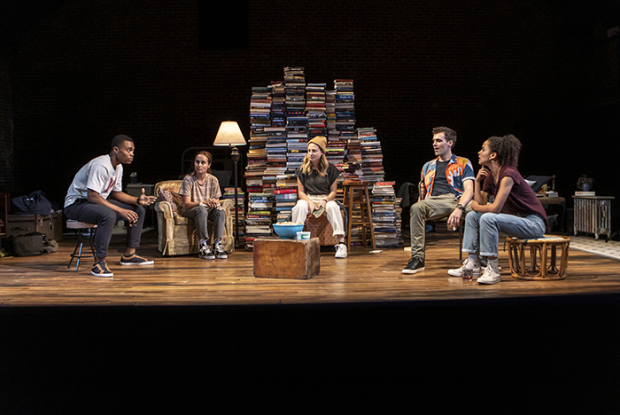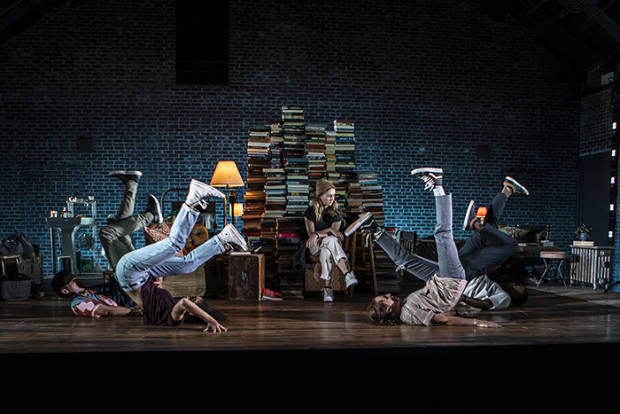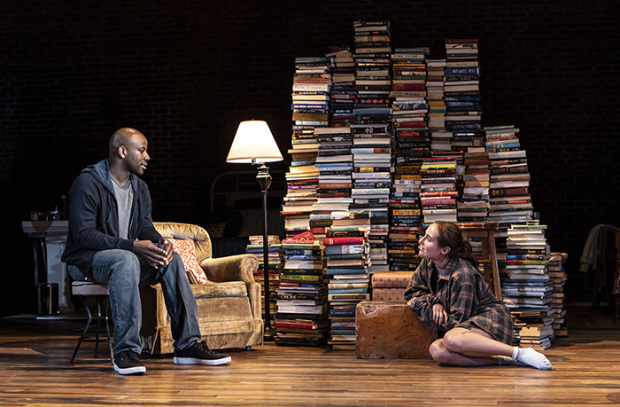Jack Thorne Redefines Sunday Scaries for Young Adults Staring Into the Future
The Tony-winning playwright of ”Harry Potter and the Cursed Child” brings a different kind of coming-of-age play to Atlantic Theater Company.

(© Monique Carboni)
Sunday is the universal day of dread — the day you peer into the black hole of the coming week and wonder what's ahead with a mix of anticipation and anxiety. Jack Thorne seems to consider that an apt metaphor for life in your 20s, which is what his new play Sunday, an Atlantic Theater Company commission, zooms in on inside a New York City apartment that its tenants describe as "cheap chic."
Transitioning from the adolescent world of witchcraft and wizardry that he explored in Harry Potter and the Cursed Child, Thorne turns his attention to a group of educated and age-appropriately self-important young adults who gather around a bowl of potato chips and debate the merits of Anne Tyler's Dinner at the Homesick Restaurant. It's the subject of this week's Sunday book club session, a ritual they enjoy with a side of alcohol- and cocaine-infused emotional volatility. Why they would choose a work night for their literary bacchanal is beyond me. But the choice speaks to the broader impression that Sunday favors its ideas over its characters.
Directed by Lee Sunday Evans with an eye for shadows (lighting design by Masha Tsimring) and a yen for abstract movement (Evans breaks up scenes with interpretive dances), Sunday sits tentatively between a memory play and a kitchen drama (or I suppose kitchenette drama, considering the size of the Manhattan apartment).
Alice (Ruby Frankel embodying a scholarly Pepper Ann) welcomes us to the world of the play as our narrator, introducing us to Marie (Sadie Scott), a 24-year-old aspiring publisher who can't seem to turn an internship into a job. The second most defining moment of her life, Alice tells us, was the summer of 5th grade when a pollen allergy confined Marie to her bedroom. Is that what made her the reclusive and possibly unhirable woman she is today? Will it continue to be the event that defines her professional and personal future? We certainly put a lot of currency in the pop psychology we apply to our favorite fictional characters, so why not examine our own psyches the same way (costume designer Ntkozo Fuzunina Kunene hides Scott's body in drab tomboy attire to reinforce the picture of stunted development)?

(© Monique Carboni)
Self-analysis — much more so than literary analysis — becomes the thrust of the conversation at Sunday book club, where Alice shifts from narrator to participant (her omniscient status is never explained or justified — an odd oversight for a playwright of Thorne's Tony-winning caliber). Also in the mix, of course, is Marie, along with her roommate and cohost Jill (Juliana Canfield), an attractive and socially savvy young black woman who did manage to land a publishing job; Jill's boyfriend Milo (Zane Pais), a smug white man with hints of threatening energy and lots of inherited wealth; and Milo's best friend Keith (Christian Strange), whom Alice contextualizes as a "black scholarship kid at Milo's mostly white fancy private school" to preface his "defining moment" story.
What ensues is an all-too-manufactured conversation about the way we build our personal narratives and mythologize those laid out in our favorite stories. Milo bemoans the self-pitying tendencies in fiction while Marie extols the virtues of self-reflection, and the two of them live their lives accordingly: Milo barrels through relationships with the unapologetic identity of "not-a-sweet-guy"; and the introverted Marie relies on her mountain of books (the centerpiece of designer Brett J. Banakis's grungy replica of a makeshift apartment) like a life source (Pais is duly unnerving as the book club bully, while Scott's inner tumult reads loud and clear).
It all adds up to a patchy picture of where these young adults have been and where they are likely to go from here. After all, our 20s are just the building blocks for "real life," which comes later — right? Marie's downstairs neighbor Bill (a sympathetic Maurice Jones) may beg to differ, being a 37-year-old amateur sci-fi novelist who shares (and appreciates) some of Marie's quirks and presumably also lives in a drab apartment.
We learn all this in a final scene that crosses Frankie and Johnny with Benny and Joon, though maybe it's wrong to define their story in terms of other stories, since it's all just an artificially neat way to package a life to begin with. That's one possible conclusion to draw from a trip to Sunday. However, I think we can all agree that the most essential lessons are: Avoid friendships with recent college graduates, and never join a book club.

(© Monique Carboni)








